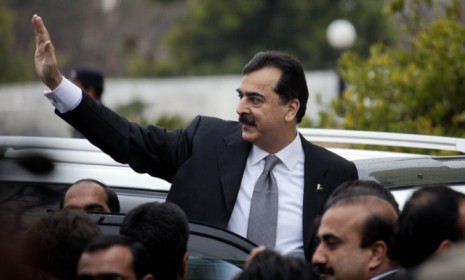Pakistan ousts its prime minister: 3 repercussions
The country's Supreme Court kicks out Prime Minister Yousuf Raza Gilani, rattling an already shaky U.S. ally. What's next?

A free daily email with the biggest news stories of the day – and the best features from TheWeek.com
You are now subscribed
Your newsletter sign-up was successful
Pakistan was thrust into political turmoil on Tuesday, when the country's Supreme Court dismissed Prime Minister Yousuf Raza Gilani over a contempt charge stemming from Gilani's refusal to ask Swiss authorities to reopen money laundering cases against his boss, President Asif Ali Zardari. Pakistan's National Assembly, the lower house of its Parliament, will elect a new prime minister on Friday, but the country's political crisis is expected to continue as the government heads toward elections scheduled for next spring. Here, three consequences of the Supreme Court's power play:
1. Pakistan will sink deeper into dangerous uncertainty
Things could hardly be going worse in Pakistan, says Omar Waraich at TIME. Discord between the government and the judiciary is peaking, and the country is quite "vulnerable to a new phase of political instability." And remember, the government was "already weak, unpopular, and faltering." Power outages have fueled "a rash of violent riots." The "teetering economy... may need yet another IMF bailout." Troubled "relations with the U.S. languish at an all-time low." Now, thanks to the Supreme Court's aggressive power play, "these and other challenges will remain neglected" while politicians squabble.
The Week
Escape your echo chamber. Get the facts behind the news, plus analysis from multiple perspectives.

Sign up for The Week's Free Newsletters
From our morning news briefing to a weekly Good News Newsletter, get the best of The Week delivered directly to your inbox.
From our morning news briefing to a weekly Good News Newsletter, get the best of The Week delivered directly to your inbox.
2. Repairing U.S.-Pakistan relations will have to wait
The effort to restore the relationship between Washington and Islamabad has been "indefinitely delayed," says Ahmed Rashid at The Christian Science Monitor. Pakistan is now in the throes of a political crisis and an economic crisis. Those are its priorities right now. Once Pakistan forms a stable government with a clear mandate, "then we can talk about the U.S. relationship." But for now, that's on ice.
3. The new PM will face the same problems as his predecessor
This changes nothing, says Rob Crilly at Britain's Telegraph. No matter who he is, the next prime minister will muddle along "the same as the last one by ignoring the big questions" and focusing on keeping the government alive — and the military out of power — until new elections can be held. Then this government will "become the first in Pakistan's short, coup-riddled history to hand over power in a democratic transition." Unfortunately, that won't solve Pakistan's problems with terrorists, power blackouts, and a "shambolic tax structure." And Gilani's replacement will face the same Supreme Court issue that sank him, so "the whole sorry business will start all over again."
A free daily email with the biggest news stories of the day – and the best features from TheWeek.com
-
 Political cartoons for February 21
Political cartoons for February 21Cartoons Saturday’s political cartoons include consequences, secrets, and more
-
 Crisis in Cuba: a ‘golden opportunity’ for Washington?
Crisis in Cuba: a ‘golden opportunity’ for Washington?Talking Point The Trump administration is applying the pressure, and with Latin America swinging to the right, Havana is becoming more ‘politically isolated’
-
 5 thoroughly redacted cartoons about Pam Bondi protecting predators
5 thoroughly redacted cartoons about Pam Bondi protecting predatorsCartoons Artists take on the real victim, types of protection, and more